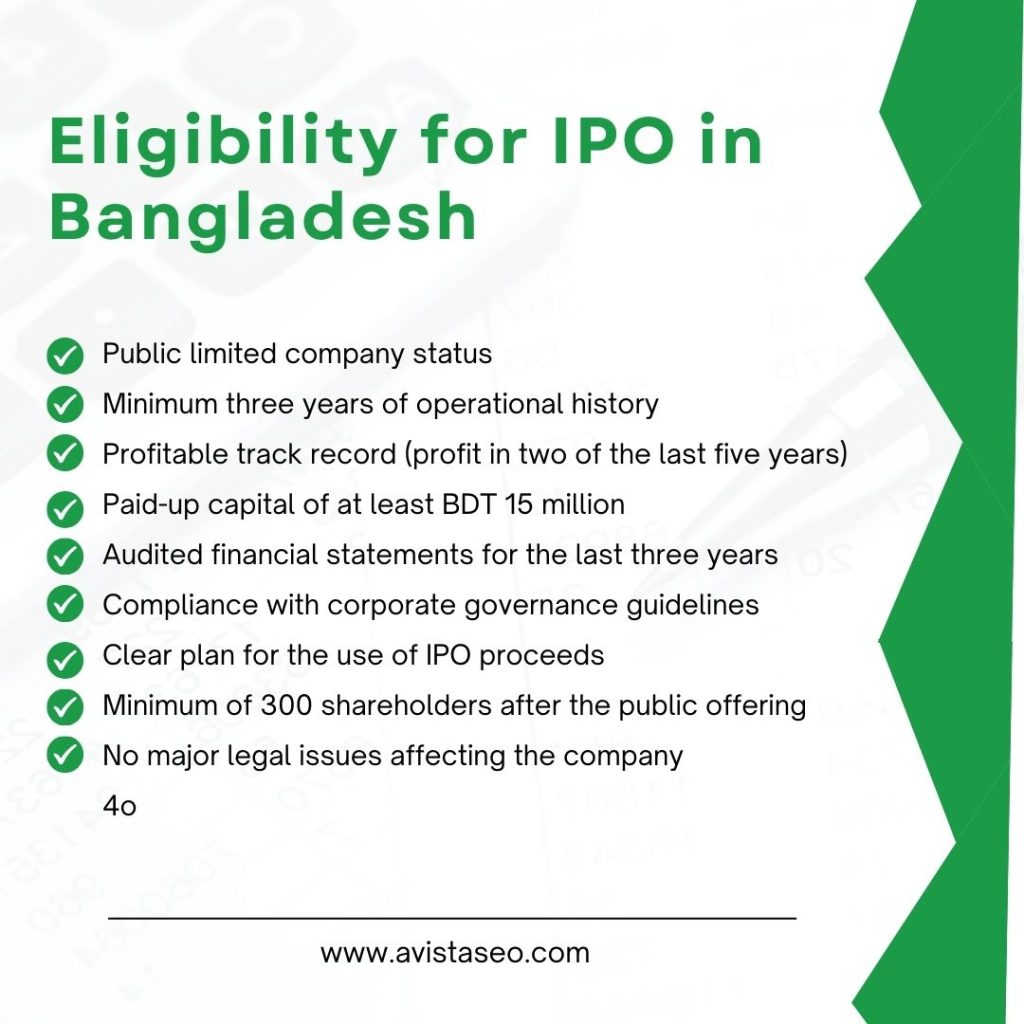IPO Process in Bangladesh
Are you thinking about taking your startup to the next level? Going public through an Initial Public Offering (IPO) can be a game-changer. But what exactly is an IPO, and why should startups in Bangladesh consider it? This guide will walk you through everything you need to know about the IPO process in Bangladesh, from understanding the basics to navigating the legal and regulatory maze.

Table of Contents
What is an IPO?
An IPO marks the first time a company offers its shares to the public. This move can inject significant capital into the business, enabling rapid growth and expansion. For startups, this means access to new resources, increased visibility, and a solid reputation in the market.
In this comprehensive guide, you’ll learn about the IPO process in Bangladesh, the key steps involved, and the benefits and risks. We’ll also share success stories of startups that have gone public, helping you decide if an IPO is the right move for your venture.
Eligibility for IPO in Bangladesh
If you’re a business owner in Bangladesh thinking about taking your company public, understanding the eligibility requirements for an Initial Public Offering (IPO) is crucial. Going public through an IPO means your company will offer shares to the public on the stock exchange, allowing you to raise funds, expand your business, and enhance your reputation. Here’s a simple guide to help you understand whether your company is eligible for an IPO in Bangladesh.
1. Company Type
To be eligible for an IPO in Bangladesh, your company must be a public limited company. This means that if you’re currently running a private limited company, you’ll need to convert it into a public limited company to meet this requirement.
2. Business History
Your company should have a minimum operational history of three years to be eligible for an IPO. This is to ensure that your business has been active and stable for a reasonable period before seeking to go public.
3. Profitable Track Record
To ensure that only financially stable companies go public, one of the main requirements is that your company must have a record of profitability. Specifically, your company should have made a profit in at least two of the last five years. This shows potential investors that your business has a sustainable model and offers a good return on investment.

4. Paid-up Capital
Your company’s paid-up capital is another important factor. To apply for an IPO in Bangladesh, your paid-up capital must be at least BDT 15 million. Paid-up capital is the amount of money shareholders have already invested in the company. This requirement ensures that your company is financially sound before going public.
5. Financial Statements
Transparency is key when going public. Your company needs to provide audited financial statements for the last three years. These financial reports must be audited by a recognized audit firm. Investors rely on these reports to understand the financial health of your business before buying shares.
6. Corporate Governance
Good corporate governance practices are essential. Your company must follow the Bangladesh Securities and Exchange Commission (BSEC) guidelines for corporate governance. This includes having a board of directors, ensuring independent directors are part of your team, and maintaining transparency in decision-making processes.
7. Use of IPO Proceeds
When applying for an IPO, you’ll need to clearly state the purpose of the funds you plan to raise. Whether it’s for expanding operations, entering new markets, or improving infrastructure, you must outline how the money will be used. This helps investors understand where their money will be invested.
8. Minimum Number of Shareholders
For a company to be eligible for an IPO, it should have a minimum of 300 shareholders after the public offering. This ensures a wide distribution of shares and prevents control by a few large investors.
9. No Major Legal Issues
Your company should be free from any significant legal problems. If there are ongoing legal disputes or liabilities, these must be disclosed, as they can affect your company’s reputation and eligibility for an IPO.
Final Thoughts
Meeting the eligibility criteria for an IPO in Bangladesh is the first step towards going public and unlocking new growth opportunities for your company. It’s important to carefully review all requirements and ensure your company is in good financial and legal standing. Going public can be a great way to raise funds, increase visibility, and attract new investors, but it requires thorough preparation and planning.
If you’re considering an IPO, it might be helpful to consult with financial advisors and legal experts to guide you through the process and make sure your company meets all the necessary criteria.
Steps for IPO approval in Bangladesh: A Step-by-Step Guide
Navigating the Bangladesh stock market IPO process can be complex, especially in a market like Bangladesh. Here’s a step-by-step guide to help you understand what to expect.
Initial Preparations
Assessing your company’s readiness before embarking on the Bangladesh Securities and Exchange Commission IPO rules journey is crucial. This involves financial audits, legal checks, and operational reviews. Make sure your financial records are transparent and up-to-date, as potential investors and regulatory bodies will scrutinize them.
Choosing Advisors and Underwriters
Selecting the right advisors and underwriters is a critical step. These professionals will guide you through the legal, financial, and logistical aspects of the IPO. Look for advisors with experience in the Bangladeshi market to ensure a smooth process.
Filing with Regulatory Bodies
In Bangladesh, companies must file with the Bangladesh Securities and Exchange Commission (BSEC). This involves submitting detailed financial reports, business plans, and other essential documents. The BSEC will review these filings to ensure compliance with local regulations.
Preparing for an IPO application process in Bangladesh
Preparation is key to a successful IPO. Let’s explore some of the crucial considerations and prerequisites for IPO requirements in Bangladesh.
Financial Audits and Transparency
Maintaining financial transparency is non-negotiable. Conduct thorough financial audits to ensure accuracy and compliance. Transparent financial practices not only build investor trust but also streamline the regulatory approval process.
Corporate Governance
Strong corporate governance structures are essential. Establish a board of directors with experienced professionals who can provide valuable insights and guidance. Implementing robust governance practices will enhance your company’s credibility.
Market Positioning
Understanding your market positioning is vital. Conduct market research to identify your competitive advantage and target audience. Crafting a compelling narrative about your company’s growth potential will attract investors.
The Legal and Regulatory Framework for Eligibility for IPO in Bangladesh
Navigating the legal and regulatory landscape is a critical aspect of the Public listing procedure in Bangladesh
Bangladesh Securities and Exchange Commission (BSEC)
The BSEC is the primary regulatory authority overseeing IPOs in Bangladesh. Companies must adhere to BSEC guidelines and regulations throughout the IPO process. This includes submitting accurate financial reports and complying with disclosure requirements.

Legal Documentation
Prepare comprehensive legal documentation, including the prospectus, which provides essential information about your company to potential investors. The prospectus must comply with BSEC regulations and include details about your business operations, financials, and growth prospects.

Compliance with Listing Requirements
Ensure your company meets the listing requirements of the stock exchange where you intend to go public. This includes financial thresholds, corporate governance standards, and other criteria set by the exchange.
IPO Costs Benefits and Risks for Startups
Going public involves various costs, benefits, and risks. Here’s what startups need to consider.
Costs of an IPO
The IPO process incurs several costs, including legal fees, underwriting fees, and marketing expenses. Additionally, ongoing compliance and reporting costs must be factored in. It’s essential to budget for these expenses to avoid financial strain.
Benefits of Going Public
The benefits of going public can be substantial. An IPO can raise significant capital, allowing your startup to invest in growth initiatives, research, and development. It also enhances your company’s visibility and credibility, attracting more customers and partners.
Risks and Challenges
Despite the benefits, there are risks associated with going public. Market volatility, regulatory changes, and increased scrutiny from investors and regulators can pose challenges. It’s crucial to have a risk management strategy in place to mitigate these potential pitfalls.
Success Stories of Startups That Went Public in Bangladesh
Learning from the experiences of successful startups that have gone public can provide valuable insights and inspiration.
Grameenphone Ltd
Grameenphone Ltd, a leading telecommunications company in Bangladesh, successfully went public in 2009. The IPO was oversubscribed, highlighting investor confidence in the company’s growth potential. Since then, Grameenphone has expanded its services and maintained a strong market presence.
Beximco Pharmaceuticals Ltd
Beximco Pharmaceuticals Ltd, a prominent player in the pharmaceutical industry, launched its IPO in 2005. The IPO allowed the company to raise capital for expansion and innovation. Today, Beximco Pharmaceuticals is a leading name in the healthcare sector.
Robi Axiata Ltd
Robi Axiata Ltd, another major telecommunications provider, went public in 2020. The IPO marked a significant milestone in the company’s growth journey, enabling it to invest in network expansion and digital services.
IPO Benefits for Bangladeshi Companies
An Initial Public Offering (IPO) can be a game-changing step for Bangladeshi companies, offering various advantages that support growth and long-term sustainability. Going public not only strengthens a company’s financial position but also enhances its overall reputation and visibility in the market. Here are some key benefits of IPOs for companies in Bangladesh:
1. Access to Capital for Expansion
One of the primary reasons companies in Bangladesh opt for an IPO is the significant influx of capital. By selling shares to the public, businesses can raise substantial funds without the need for bank loans or private investors. This capital can be used to expand operations, enter new markets, invest in research and development, or pay off existing debt, thereby boosting growth potential.
2. Enhanced Corporate Credibility
Publicly traded companies are often viewed as more trustworthy and stable by investors, customers, and partners. Listing on the Dhaka or Chittagong Stock Exchange provides visibility and enhances the company’s image. This increased credibility can lead to new business opportunities, partnerships, and improved customer confidence.
3. Liquidity for Founders and Early Investors
An IPO provides an opportunity for early investors and company founders to realize the value of their investment. By selling shares on the stock market, these stakeholders can partially or fully exit their investment, converting their ownership stakes into liquid assets.
4. Attracting and Retaining Talent
Public companies often offer stock options and equity-based compensation to employees, which can be an attractive benefit for current and prospective talent. This can help companies in Bangladesh attract top talent in a competitive market and retain key employees, contributing to the company’s long-term success.
5. Improved Financial Transparency
Going public requires a higher level of financial disclosure and transparency. While this is a legal obligation, it also offers internal benefits, such as better financial discipline and governance. The requirement to maintain strict compliance with regulations ensures that public companies in Bangladesh operate with greater accountability, which can enhance operational efficiency.
6. Diversification of Ownership
An IPO allows for the diversification of ownership, reducing reliance on a small group of investors or the founding team. This can help spread financial risk and ensure that decision-making is more democratic and less influenced by any one group.
7. Growth in Market Valuation
A successful IPO can significantly increase the market valuation of a company. Publicly traded shares offer more flexibility in determining the value of the business, and positive market sentiment can drive up stock prices, benefiting the company and its shareholders.
8. Opportunity for Future Financing
Being listed on the stock exchange makes it easier for companies to raise additional funds in the future. A public company has access to a broader range of financing options, including issuing more shares or bonds, enabling it to pursue further expansion or investments as needed.
9. Mergers and Acquisitions
Public companies can use their stock as a currency to acquire other businesses. This is particularly beneficial for companies looking to grow through mergers and acquisitions. The availability of publicly traded shares provides flexibility in structuring deals.
Is an IPO the Right Move for Your Startup?
Deciding whether to pursue an IPO is a significant decision for any startup. While the benefits can be substantial, it’s essential to weigh the costs and risks carefully.
Assess your company’s readiness, conduct thorough financial audits, and establish strong corporate governance practices. Understand the legal and regulatory requirements, and prepare comprehensive documentation. Learning from the success stories of other startups can provide valuable insights.
Ultimately, an IPO can be a powerful tool for raising capital, enhancing visibility, and driving growth. However, it’s crucial to have a clear strategy and risk management plan in place.
Exploring Further Resources
Ready to take the next step? Connect with industry experts and advisors who can guide you through the IPO process in Bangladesh. Attend workshops and seminars to gain deeper insights into the Bangladeshi market and regulatory landscape.
If you’re still unsure, consider reaching out for a consultation with professionals who specialize in IPOs. They can provide personalized advice and help you determine if an IPO is the right move for your startup.
Taking your startup public is a significant milestone, and with careful planning and preparation, it can open doors to new opportunities and growth.
Remember, the IPO process in Bangladesh may seem complex, but with the right guidance and resources, you can navigate it successfully. Good luck on your IPO journey!



